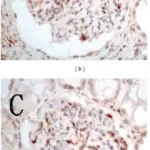IgA nephropathy is also known as Berger disease. Is a disease of the kidney that arises when there is a deposition of the IgA antibody in great amounts.
What is the Pathology of IgA Nephropathy?
The pathology of IgA nephropathy is:
-Etiology: The cause of IgA nephropathy is genetic predisposition, liver disease, infections, celiac diseases.
-Genes involved: Unknown.
-Pathogenesis: The sequence of events that lead to IgA nephropathy is due to the accumulation of immunoglobulin A in the mesangial membranes. The tapped IgA causes inflammation and poor filtration process causing nephropathy.
-Morphology: Not applicable.
-Histology: The histology associated with IgA nephropathy shows branching mesangial deposits, immune deposits.
How does IgA Nephropathy Present?
Patients with IgA nephropathy typically are affected more present at the age range of 12-30 years. The symptoms, features, and clinical findings associated with IgA nephropathy include tea-colored urine, foamy urine, pain at the location of the kidneys, edema, hypertension.
How is IgA Nephropathy Diagnosed?
IgA nephropathy is diagnosed by urine tests, blood tests, kidney biopsy, iothalamate clearance test.
How is IgA Nephropathy Treated?
IgA nephropathy is treated by antihypertensives, omega-3 fatty acids, immunosuppressants, statin therapy, diuretics.
What is the Prognosis of IgA Nephropathy?
The prognosis of IgA nephropathy is fair since 70% of those with this disease have a normal life expectancy.



